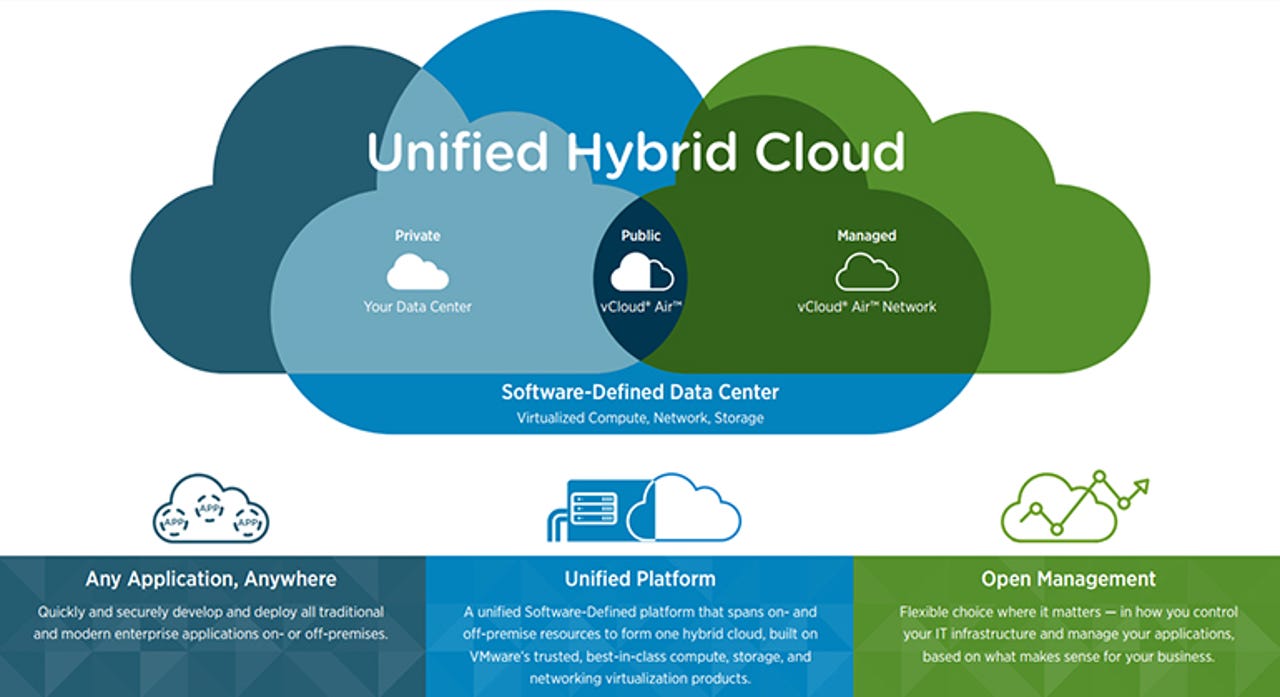VMware's vision and roadmap for hybrid cloud

Few would argue that VMware is the reigning champion of virtualization. But the company has also been slowly but surely building out offerings in the cloud -- and more specifically, the hybrid cloud.
Why? Well, the first reason is because that is the direction its customers are heading. Many large organizations require both the flexibility of public cloud capabilities and the security and speed of a private cloud deployment, and VMware wants to meet that need.
SEE: Power checklist: Managing and troubleshooting cloud storage (Tech Pro Research)
The second reason VMware is engaging with the hybrid cloud is simply that it's necessary for the company to stay competitive in the market.
Here's a look at the company's journey to the hybrid cloud, its role in cloud adoption, and how that journey is changing its business model.
Vision and roadmap

With the exception of Microsoft, most hybrid cloud providers offer a proprietary public or private cloud, partnering with other providers to supply the remaining pieces. VMware is no exception: its hybrid cloud strategy is built on core vSphere-based private cloud technology, with public cloud services supplied via an ecosystem of vCloud Air partners.
Dave Bartoletti, an analyst at Forrester Research, said that VMware's approach to hybrid cloud is similar to other large technology vendors in the enterprise space, like IBM and HP.
"There's a strong focus on extending enterprise management tools and software-defined data center infrastructure to the cloud, rather than rebuilding apps on cloud-native infrastructure," Bartoletti said.
VMware itself echoes these sentiments. When asked about the company's vision for the hybrid cloud, VMware's executive vice president and general manager SDDC Raghu Raghuram said: "VMware's cloud approach is focused on expanding our leadership in private cloud, extending the software-defined data center into the public cloud and enabling the security of cloud-native and SaaS applications."
VMware offers a wide array of tools and applications along with its cloud platforms. Existing VMware products like NSX (network virtualization), vRealize (cloud management), and AirWatch (enterprise mobility management), as well as an IBM cloud partnership, broaden its offerings across IT operations, cloud and even DevOps.
"This can be appealing to large enterprises balancing new technology and methodology with existing infrastructure and process, which is often centered on VMware." said Jay Lyman of 451 Research. "However, it can also limit the opportunity for VMware's offerings to existing VMware shops."
VMware's current and future roles
VMware's customer base is very large -- currently over 500,000 strong, according to Raghuram. And, not only is the customer base large, it's also loyal, said Forrester's Bartoletti. That loyalty means that many of those customers -- infrastructure admins, operations admins, and engineers -- will be looking to VMware to help them understand the future of virtualized apps.
If VMware can successfully convince its customers of its vision for hybrid cloud, it stands to play a major role in the overall adoption of hybrid cloud in the enterprise. This is a key moment for VMware, argues 451 Research's Lyman, because it is often targeted for replacement by the public and private cloud options, and container tools. VMware has to convince users that its offering is the best and most effective option.
However, this will require a shift in VMware's business model, as the company is known for selling software while cloud is typically delivered as a service. In order to meet customer needs, VMware's engineering and product teams are working on the challenges presented by the business model shift.
"Some of those solutions will be delivered as software, some as part of appliances, and some as cloud services -- either from us or a partner," Raghuram said.
SEE: VMware's five key cloud-native computing investments (TechRepublic)
Challenges exist on the customer side of things as well -- primarily in how customers think about consuming the services. According to Raghuram, a change in approach is required.
"First, they shift their mindset to think and act like a software company," he said. "Second, they adopt the fundamental operating characteristics of a software company. They focus on creating agile and lean processes, plan for web scale and flexibility. And they automate everything, allowing as much self-service as possible."
The rise of cloud-native app deployment presents another potential speed bump along the way. The massive installed base of virtualized apps will make existing products like vCloud Air a low-risk option for some enterprises, Bartoletti said, but VMware will need to provide more options to cloud-native development teams in order to stay competitive against other hybrid cloud providers. VMware has begun making some strategic cloud-native investments, and those could pay off dividends if they are leveraged properly.
Also see
- VMware Integrated Containers critical to company's DevOps strategy (TechRepublic)
- VMware swears it will continue to support Fusion and Workstation after firing both programming teams (ZDNet)
- Decoding VMware's mysterious containerization strategy (TechRepublic)
- VMware: Dell's purchase and the spoils of war (ZDNet)
- Is VMware NSX more than just a security platform? (TechRepublic)